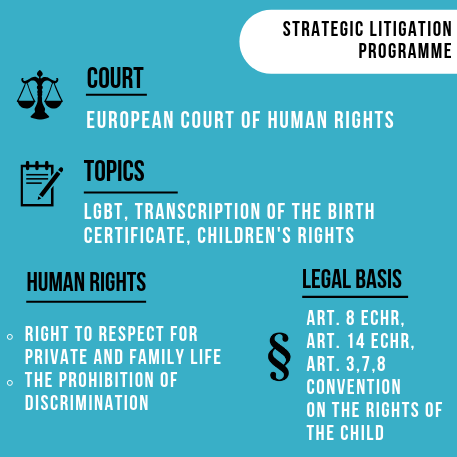
European NGOs submit a joint amicus curiae brief to ECtHR in a case involving the confirmation of Polish citizenship for a child of a same-sex couple
International organisations intervene in the case of a child of a same-sex couple. The Helsinki Foundation for Human Rights, together with the European Region of the International Lesbian, Gay, Bisexual, Trans and Intersex Association (ILGA-Europe), the Network of European LGBTIQ* Families Associations (NELFA), The Child Rights International Network (CRIN) and the Polish Society of Anti-Discrimination Law, presented the Strasbourg Court with an amicus curiae brief in a case concerning the confirmation of Polish citizenship for the children of a same-sex couple.
A child of an LGBT couple without Polish citizenship?
The children were born in the United States in 2010 from a contractual surrogate mother. In accordance with the ruling of an American court, two male partners were found to be natural and fully-fledged parents of the children. One of the men, a Polish national, is also their biological father.
In 2012, the parents launched legal proceedings seeking to confirm Polish citizenship of their children. Under the Polish Citizenship Act, a person may acquire Polish citizenship if, among other things, at least one of this person’s parents is a Polish citizen themselves. Nevertheless, the Mazovia Province Governor refused to confirm the child’s citizenship. This decision was later upheld by the Minister of the Interior and the administrative courts. The administrative bodies and courts have decided that foreign birth certificates of children that name same-sex persons as the parents did not have any legal effects in Poland. According to Polish authorities, the recognition of same-sex parents would violate basic principles of the Polish legal system.
In the aftermath of the national proceedings, the parents have submitted an application to the ECtHR, complaining that the refusal to confirm Polish citizenship violated their children’s right to respect for private and family life (Article 8 of the European Convention on Human Rights) and the prohibition of discrimination on grounds of sexual orientation (Article 14 of the ECHR).
Best interests of the child are paramount, say the amici curiae
In the brief presented to the Court, the organisations noted that the case should be considered in the light of the Convention on the Rights of the Child, which provides that authorities should be guided by the best interests of the child in deciding all cases concerning the child’s situation. In addition, the Convention prohibits discrimination against children on grounds of birth. At the same time, it requires that the identity of the child should be respected, which includes their nationality, surname and family relationships. The authors of the amicus curiae brief pointed out that this case should not be seen in the context of the legalisation of same-sex unions or the surrogacy procedure, but as a matter of children’s rights. The organisations also noted a recent advisory opinion of the ECHR, which concerned the French case involving transcription of the birth certificate of a child born from a surrogate mother. In the opinion, the ECtHR held that the child’s best interests require that domestic law must provide a possibility of the recognition of the relationship between a child born by a surrogate mother and a woman registered in a foreign birth record as his intended, or legal, mother. The HFHR has filed an amicus curiae opinion in that case. At that time, the Foundation argued that, as a rule, a birth certificate should be transcribed in full, i.e. in relation to both the father and the host (intended) mother.
In their comments to the Court, the organisations also presented judicial practices regarding the cases of children of same-sex couples in other jurisdictions. For example, courts in Spain, Italy, Germany and the Czech Republic have admitted transcriptions of birth certificates of children born as a result of a surrogacy agreement or confirmed the parental rights of same-sex parents, invoking the best interests of the child as a basis of their decisions.
2018: Polish administrative courts start to rule in same-sex couples’ favour
It is worth noting that in 2018 also the Polish Supreme Administrative Court ruled that it was necessary to confirm the Polish citizenship of the children of a same-sex couple, who were born as a result of a surrogacy agreement. The Supreme Administrative Court stressed that for the purposes of establishing the legal status of a child, which include confirming their Polish citizenship, it is irrelevant whether the child was born from a surrogate mother, because the child as a human being is endowed with natural and inalienable dignity and has the right to citizenship if one of the parents is a Polish citizen.
Also in 2018, the Supreme Administrative Court ruled on the admissibility of transcription of a foreign birth certificate which lists two women as the child’s parents. The SAC held that the obligation to transcribe a birth certificate, carried out for the sole purpose of protecting rights of the child and certifying their identity, did not contravene the fundamental principles of the Polish legal system. Moreover, if the transcription was refused, this would lead to a breach of EU law and international laws protecting children’s rights.
These rulings constitute a departure from the previous line of judicial reasoning that was unfavourable for the children of same-sex couples. The HFHR has taken part in both proceedings as a party.
Amicus curiae is available here.


06.08.2019
 Cookies EN
Cookies EN